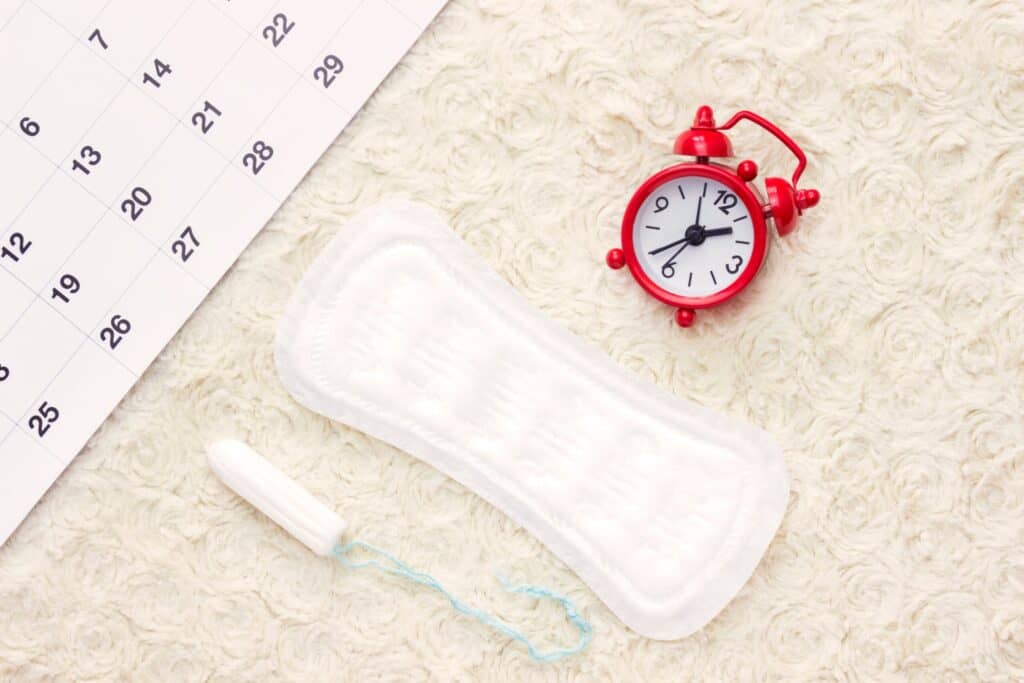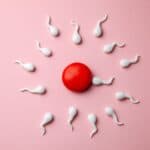Blog

Five tips to help you get your period back
Hypothalamic Amenorrhea – things you should know and nutritional considerations
Hypothalamic amenorrhea is a type of chronic anovulation, which is the lack of ovulation in people with a uterus.
To break it down, hypothalamic refers to the part of the brain responsible for regulating reproduction, known as the hypothalamus; amenorrhea means the absence of menstruation. So hypothalamic amenorrhea is the loss of the menstrual cycle due to a disruption to the hypothalamus.
What causes hypothalamic amenorrhea?
The hypothalamus controls the release of the reproductive hormone gonadotropin-releasing hormone (GnRH), which is responsible for triggering the beginning of the menstrual cycle and the production of estrogen.
In people with hypothalamic amenorrhea, chronic stress triggers the body to redirect its energy towards bodily processes that are critical for survival, rather than reproduction. This causes signalling to the hypothalamus to be disrupted, leading to inadequate levels of GnRH and estrogen for menstruation.
The chronic stress that leads to hypothalamic amenorrhea has three main causes: severe calorie restriction, excessive exercise and major psychological stress. Consequently, hypothalamic amenorrhea is common in people experiencing eating disorders.
To learn more about the causes of amenorrhea, check out this blog post on The Food Medic’s website!
Are there long-term consequences of hypothalamic amenorrhea?
While missing your period without the side effect of a baby might sound like a dream, it should really ring alarm bells! Hypothalamic amenorrhea affects not just reproduction, but several other systems in the body. While some of these effects are short-term, many have lifelong consequences.
Reproductive system
Estrogen deficiency in hypothalamic amenorrhea mimics the effects of early menopause. While this is usually reversible, it can cause permanent infertility and painful intercourse, as over time, low estrogen levels can cause the muscles of the uterus to atrophy and the endometrial lining to break down.
Even if you are not planning to fall pregnant soon (or ever!), it’s important to treat hypothalamic amenorrhea due to its effects on the cardiovascular, skeletal and neurological systems of the body.
Cardiovascular system
Although estrogen is most well known as a reproductive hormone, it also plays a major role in heart health.
Estrogen protects from cardiovascular disease by helping to keep the blood vessels flexible. It also decreases levels of LDL cholesterol in the blood – also known as the “bad” cholesterol that builds up and clogs the arteries.
Consequently, long-term estrogen deficiency can cause the blood vessels to become stiff, and congested, increasing the risk of high blood pressure and heart disease.
The more irregular a young persons’ menstrual cycle, the greater their risk of future cardiovascular disease.1
Skeletal system
Bone density (which determines bone strength and the likelihood of fractures) is also strongly affected by hypothalamic amenorrhea.
You probably already know that calcium is one of the key nutrients for maintaining bone health and that is found in dairy products and leafy green vegetables. When calorie intake is restricted, as is often seen in hypothalamic amenorrhea, calcium intake is likely to also be inadequate.
Additionally, another role of estrogen is to stimulate bone-building activity and to assist with calcium absorption in the gut. Consequently, ongoing low estrogen levels can lead to the suppression of bone production and an increased risk of fractures, osteoporosis and osteopenia.
Bone density is affected even more drastically if hypothalamic amenorrhea occurs during adolescence, as around 50% of bone mass is built during puberty.
Neurological system
As hypothalamic amenorrhea is caused by chronic stress, it goes without being said that it is associated with high cortisol (also known as our stress hormone). Cortisol levels not only rise within the body’s tissues, but also in the cerebrospinal fluid, which is the liquid surrounding the brain and spinal cord. This can negatively affect brain health and increase the risk of neurodegenerative conditions like dementia and Alzheimer’s.
Estrogen also plays a role in regulating the microglial cells, which are the main form of immune defence in the brain and spinal cord. When estrogen levels are low and chronic stress is high, the unregulated inflammation can negatively affect the brain and increase the risk of neurodegenerative diseases.
How is hypothalamic amenorrhea treated?
While hypothalamic amenorrhea is treated by addressing the underlying cause, the negative effects on the body described above can be partially managed with nutrition.
Here are five tips to help you to get your period back and avoid the nasty side effects of hypothalamic amenorrhea.
ONE: Eat frequently and enough
As a general rule, eating a meal or snack every three to four waking hours is a good guideline to follow. To make sure your portion sizes are adequate, you might find it helpful to enlist the help of a friend or family member with “normal” eating habits, and base your plate on theirs.
Fats are particularly important in healing hypothalamic amenorrhea as they are needed for the production of reproductive hormones. There is also evidence that consuming full-fat dairy products can decrease the risk of infertility in people with anovulatory conditions, so make sure you’re getting enough dairy!2
If you’re struggling with disordered eating or an eating disorder, eating at frequent intervals is certainly easier said than done. That’s where we come in! Our dietitians at Embody Health London work with clients to renourish themselves and build a healthier relationship with food.
TWO: Let your body reach its set point weight
A common misconception is that hypothalamic amenorrhea can only occur in people with an extremely low body weight. This is totally false!
Furthermore, what is considered a healthy weight for one person could be underweight for another. It’s important to let your body find the weight that is healthiest for you – also known as your set point weight. You can learn more about set point theory here.
THREE: Reduce exercise
It might sound odd to suggest a person exercise less in a society where we only ever hear that we should be exercising more. However, if you suspect excessive exercise is the cause of your missing period, cutting back on your workouts is the healthiest thing you can do for yourself.
Give yourself permission to rest and recover.
FOUR: Supplement calcium and vitamin D
To help to counteract the impact of hypothalamic amenorrhea on the skeletal system, it can be helpful to supplement both calcium and vitamin D for bone strength. While calcium makes up the building blocks of bone mass, vitamin D is essential for its absorption from food. You can also get vitamin D from the sun – but don’t forget your SPF!
FIVE: Develop strategies for coping with stress
Not only is hypothalamic amenorrhea caused by stress, but those experiencing it have significantly higher depression and anxiety symptoms, as well as greater difficulty coping with daily stress.3
Consequently, it’s even more important that you develop some constructive coping mechanisms to deal with stress. With exercise out of the picture, this may include things like:
- Journaling
- Spending time outdoors
- Creating art
- Gardening
- Meditation
Consider making a list of some strategies that you can turn to when you’re struggling.
We would love to support you towards your recovery from hypothalamic amenorrhea, whatever the cause. Book a free enquiry call with us to learn more about how our expert dietitians can help.
Karli Battaglia MDiet, APD
EHL Team x
References
- Solomon C, Hu F, Dunaif A, Rich-Edwards J, Stampfer M, Willett W et al. Menstrual Cycle Irregularity and Risk for Future Cardiovascular Disease. The Journal of Clinical Endocrinology & Metabolism. 2002;87(5):2013-2017.
- Chavarro J, Rich-Edwards J, Rosner B, Willett W. A prospective study of dairy foods intake and anovulatory infertility. Human Reproduction. 2007;22(5):1340-1347.
- Marcus M, Loucks T, Berga S. Psychological correlates of functional hypothalamic amenorrhea. Fertility and Sterility. 2001;76(2):310-316.














